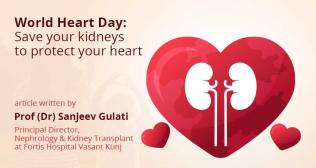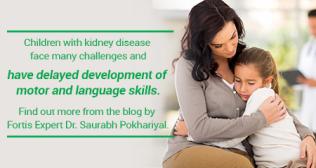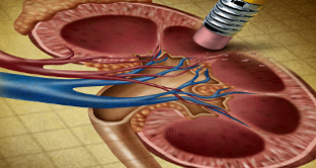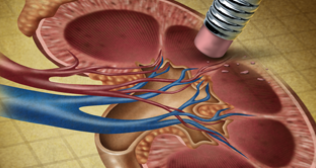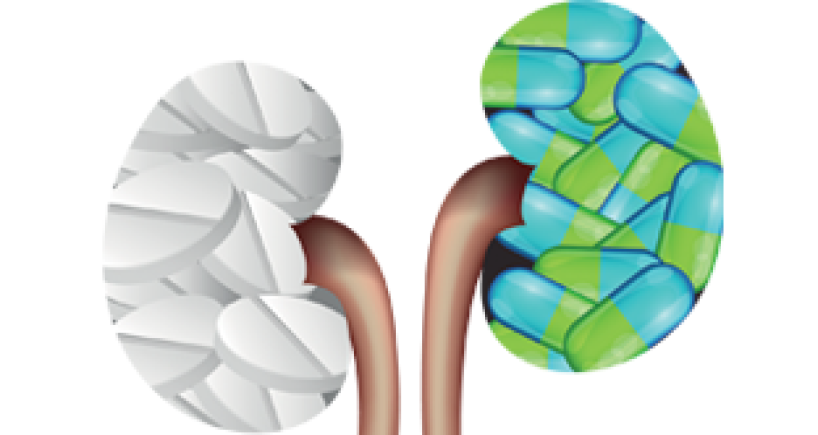
Nephrology
Healthy Kidneys Are Key To Good Health
Dr. Sanjeev Gulati Nov 17, 2014
 There is an increasing prevalence of kidney disease all around the world and also in our country. You have two kidneys, each about the size of your fist. Most people know that a major function of the kidneys is to remove waste products and excess fluid from the body. However, kidneys do much more than that.
What do kidneys do?
The kidneys are powerful chemical factories that perform the following functions:
• Remove waste products from body.
• Balance body’s fluids.
• Release hormones that regulate blood pressure.
• Produce an active form of vitamin D that promotes strong and healthy bones.
• Control the production of red blood cells.
Chronic Kidney Disease
Chronic Kidney Disease (CKD) includes conditions that damage your kidneys and decrease their ability to keep you healthy by doing the jobs listed. If the disease gets worse, wastes can build to high levels in your blood and make you feel sick. You may develop complications such as high blood pressure, anaemia, weak bones, poor nutritional health and nerve damage. Also, kidney disease increases your risk of having heart and blood vessel disease. When kidney disease progresses it may eventually lead to kidney failure, which requires dialysis or a kidney transplant to maintain life.
One in 10 Indians has CKD and another 20 million more are at increased risk.
• Early detection can help prevent the progression of kidney disease to kidney failure.
• Heart disease is a major cause of death for all people with CKD.
• Glomerular Filtration Rate (GFR) is the best estimate of kidney function.
• Hypertension causes CKD and CKD causes hypertension.
• Persistent proteinuria means CKD.
• High risk groups include those with diabetes, hypertension and family history of kidney disease.
• Three simple tests can detect CKD: Blood pressure, urine and serum creatinine.
Many people with kidney disease are still in the dark. Nearly half of the people with an advanced form of kidney disease do not know they have weak or failing kidneys. GFR is the most accurate way to diagnose kidney disease.
GFR is also the best tool to ascertain a patient’s stage of disease, enabling doctors to plot the most appropriate course of treatment. In other words, knowing your GFR can save your life.
Who are at high risk of CKD?
Anyone can get CKD at any age. However, some people are more susceptible to develop kidney disease as compared to others. You may have an increased risk for kidney disease if you:
• Have diabetes
• Have high blood pressure
• Have a family history of CKD
• Are a part of the elderly population
• Belong to a population group that has a high rate of diabetes or high blood pressure such as Indians.
Is kidney disease treatable?
Yes, in its early stages kidney disease can be treated effectively. People with CKD often take medicines to lower blood pressure, control blood glucose, and lower blood cholesterol. Two types of blood pressure medicines — ACE inhibitors and ARBs — may slow CKD and delay kidney failure, even in people who don’t have high blood pressure. They also may need to take a diuretic (water pill).
When is dialysis/transplant required?
Once the estimated kidney function (GFR) declines to less than 30 ml/min per 1.73 m2, it is time to start preparing the patient and the family for dialysis or kidney transplant. This will be needed when the GFR falls below 10-15 ml/min.
How to prevent kidney disease?
The key to preventing kidney disease is awareness of the common risk factors causing this condition and to ensure blood pressure and blood sugar control. We should all get into the habit of getting an annual health check-up.
There is an increasing prevalence of kidney disease all around the world and also in our country. You have two kidneys, each about the size of your fist. Most people know that a major function of the kidneys is to remove waste products and excess fluid from the body. However, kidneys do much more than that.
What do kidneys do?
The kidneys are powerful chemical factories that perform the following functions:
• Remove waste products from body.
• Balance body’s fluids.
• Release hormones that regulate blood pressure.
• Produce an active form of vitamin D that promotes strong and healthy bones.
• Control the production of red blood cells.
Chronic Kidney Disease
Chronic Kidney Disease (CKD) includes conditions that damage your kidneys and decrease their ability to keep you healthy by doing the jobs listed. If the disease gets worse, wastes can build to high levels in your blood and make you feel sick. You may develop complications such as high blood pressure, anaemia, weak bones, poor nutritional health and nerve damage. Also, kidney disease increases your risk of having heart and blood vessel disease. When kidney disease progresses it may eventually lead to kidney failure, which requires dialysis or a kidney transplant to maintain life.
One in 10 Indians has CKD and another 20 million more are at increased risk.
• Early detection can help prevent the progression of kidney disease to kidney failure.
• Heart disease is a major cause of death for all people with CKD.
• Glomerular Filtration Rate (GFR) is the best estimate of kidney function.
• Hypertension causes CKD and CKD causes hypertension.
• Persistent proteinuria means CKD.
• High risk groups include those with diabetes, hypertension and family history of kidney disease.
• Three simple tests can detect CKD: Blood pressure, urine and serum creatinine.
Many people with kidney disease are still in the dark. Nearly half of the people with an advanced form of kidney disease do not know they have weak or failing kidneys. GFR is the most accurate way to diagnose kidney disease.
GFR is also the best tool to ascertain a patient’s stage of disease, enabling doctors to plot the most appropriate course of treatment. In other words, knowing your GFR can save your life.
Who are at high risk of CKD?
Anyone can get CKD at any age. However, some people are more susceptible to develop kidney disease as compared to others. You may have an increased risk for kidney disease if you:
• Have diabetes
• Have high blood pressure
• Have a family history of CKD
• Are a part of the elderly population
• Belong to a population group that has a high rate of diabetes or high blood pressure such as Indians.
Is kidney disease treatable?
Yes, in its early stages kidney disease can be treated effectively. People with CKD often take medicines to lower blood pressure, control blood glucose, and lower blood cholesterol. Two types of blood pressure medicines — ACE inhibitors and ARBs — may slow CKD and delay kidney failure, even in people who don’t have high blood pressure. They also may need to take a diuretic (water pill).
When is dialysis/transplant required?
Once the estimated kidney function (GFR) declines to less than 30 ml/min per 1.73 m2, it is time to start preparing the patient and the family for dialysis or kidney transplant. This will be needed when the GFR falls below 10-15 ml/min.
How to prevent kidney disease?
The key to preventing kidney disease is awareness of the common risk factors causing this condition and to ensure blood pressure and blood sugar control. We should all get into the habit of getting an annual health check-up. Categories
Clear allMeet the doctor

Dr. Sanjeev Gulati
EXECUTIVE DIRECTOR NEPHROLOGY | Fortis C-Doc
- Nephrology | Nephrology
- Organ Transplant | Kidney Transplant
-
31 Years
-
1800
 Available at 1 different locations
Available at 1 different locations

Fortis Okhla







